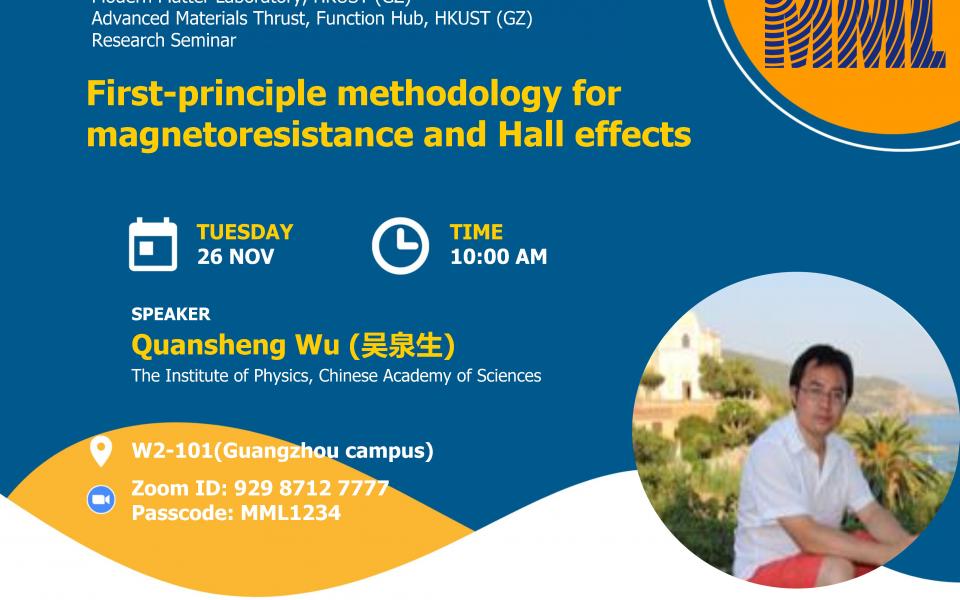MML Seminar - First-principle methodology for magnetoresistance and Hall effects
Supporting the below United Nations Sustainable Development Goals:支持以下聯合國可持續發展目標:支持以下联合国可持续发展目标:
In this talk, we will introduce a method combining first-principles calculations with semiclassical Boltzmann transport theory to compute magnetoresistance and Hall effects in real materials. It will discuss the unsaturated magnetoresistance effects in both topologically trivial and topological materials, highlighting the crucial roles of carrier compensation, open orbit mechanisms, and Fermi surface topology. Studies have shown that theoretical predictions highly align with the low-temperature experimental results of typical metals, semimetals, and Weyl semimetals, and also discovered that Kohler's rule applies to Hall resistivity, clarifying the proportional relationship and inherent laws between ordinary Hall effect and anomalous Hall effect. For the anomalous resistance peaks and Hall resistivity sign reversals in narrow-gap semiconductors, we propose a unified explanation based on multi-carrier dynamics and Fermi surface geometry. The introduced new method successfully explains the complex behaviors of magnetoresistance and Hall effects in magnetic materials, highly consistent with experimental results, and highlights the decisive role of Fermi surface shape and mean scattering time on transport properties. Additionally, we will introduce a new interpretation of the peculiar behavior of rho-T curves under magnetic fields. Our research provides a new theoretical framework for understanding magnetic transport phenomena and opens new pathways for material classification and characteristic characterization.
References:
1. Magnetoresistance from Fermi surface topology, SN Zhang, QS Wu*, Y Liu, OV Yazyev*, Physical Review B 99 (3), 035142 (2019).
2. New perspectives of Hall effects from first-principles calculations, SN Zhang, H Pi, Z Fang, H Weng*, QS Wu*, arXiv:2401.151503 (2024)
3. First-principles Methodology for studying magnetotransport in magnetic materials
Z Liu, S Zhang, Z Fang, H Weng*, QS Wu*, arXiv:2401.15146 (2024)
4. First-principles methodology for studying magnetotransport in narrow-gap semiconductors: an application to Zirconium Pentatelluride ZrTe5, H Pi, S Zhang*, Y Xu, Z Fang, H Weng*, QS Wu*, arXiv:2401.15151 (2024)
5. The inadequacy of the ρ-T curve for phase transitions in the presence of magnetic fields, Shengnan Zhang, Zhong Fang, Hongming Weng, Quansheng Wu*, arXiv:2405.15981 (2024)
6. WannierTools, https://www.wanniertools.org/
Quansheng Wu, a distinguished researcher at the Institute of Physics, Chinese Academy of Sciences. He obtained his PhD from the Institute of Physics, Chinese Academy of Sciences in 2013. From 2015 to 2021, he conducted postdoctoral research at ETHZ and EPFL, joining the Institute of Physics at the end of 2021. His main research areas are topological materials, their transport properties, and the application of machine learning in condensed matter physics. He has published several papers in prestigious journals such as Science, Nature, and Physical Review Letters, with over 11,000 citations on Google Scholar and an H-index of 34. He led the development of the WannierTools software, which has become an important tool in the field of topological materials, cited more than 2,100 times.
